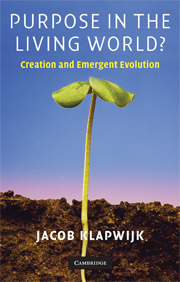Book contents
- Frontmatter
- Contents
- List of figures
- Preface
- Introduction
- 1 Does life on earth have a purpose?
- 2 Creationism, Intelligent Design, and Augustine's idea of time
- 3 Darwin, neo-Darwinism, and the naturalistic continuity claim
- 4 Miller's pre-biotic broth and the premises of evolutionism
- 5 A cold shudder along Darwin's back
- 6 The emergence theory of Morgan and Alexander
- 7 Luctor et emergo: what is emergent evolution?
- 8 Toward a general theory of emergent evolution
- 9 Hominization and the philosophy of mind
- 10 Augustinian faith and evolutionary science
- 11 The organism is a whole. The world is a habitat
- 12 The slumbering temptation of essentialism
- 13 Questions surrounding the emergence process
- 14 Enkapsis in nature. Is there an Omega point?
- Bibliography
- Index
9 - Hominization and the philosophy of mind
Published online by Cambridge University Press: 05 June 2012
- Frontmatter
- Contents
- List of figures
- Preface
- Introduction
- 1 Does life on earth have a purpose?
- 2 Creationism, Intelligent Design, and Augustine's idea of time
- 3 Darwin, neo-Darwinism, and the naturalistic continuity claim
- 4 Miller's pre-biotic broth and the premises of evolutionism
- 5 A cold shudder along Darwin's back
- 6 The emergence theory of Morgan and Alexander
- 7 Luctor et emergo: what is emergent evolution?
- 8 Toward a general theory of emergent evolution
- 9 Hominization and the philosophy of mind
- 10 Augustinian faith and evolutionary science
- 11 The organism is a whole. The world is a habitat
- 12 The slumbering temptation of essentialism
- 13 Questions surrounding the emergence process
- 14 Enkapsis in nature. Is there an Omega point?
- Bibliography
- Index
Summary
In the previous two chapters we have examined the theoretical implications that are enclosed in the concept of emergent evolution, in chapter 7 with respect to the levels in living nature and in chapter 8 with respect to the spheres in human society. In the present chapter we concentrate on the uniqueness of the human person. What makes human beings, intertwined as they are with all other living creatures on earth, so exceptional? Is it merely the emergence of mental competencies? Or is there more at play when we speak about “the infinite value of the human person?”
First we consider the frame of reference in which we want to capture the human species in its singularity (section 1). Then we will consider how Homo sapiens became human, and the evolutionary process that led to personhood (section 2). All kinds of questions arise here. Has the physical universe, from its very origin, anticipated the arrival on the scene of the human species (section 3)? Can one say about animate nature, too, that it is predisposed to the origin of human beings (section 4)? What must we think of methodological naturalism; is it applicable to living creatures, and particularly to human creatures, considering their supervenient characteristics (section 5)? All these questions lead to a critical encounter with the philosophy of mind (section 6).
- Type
- Chapter
- Information
- Purpose in the Living World?Creation and Emergent Evolution, pp. 160 - 190Publisher: Cambridge University PressPrint publication year: 2008

